Featured Posts

- Index of Psychological Studies of Presidents and Other Leaders Conducted at the Unit for the Study of Personality in Politics
- The Personality Profile of U.S. Supreme Court Associate Justice Brett Kavanaugh
- The Leadership Style of North Korean Leader Kim Jong-un
- North Korea Threat Assessment: The Psychological Profile of Kim Jong-un
- Russia Threat Assessment: Psychological Profile of Vladimir Putin
- The Personality Profile of 2016 Republican Presidential Candidate Donald Trump
- Donald Trump's Narcissism Is Not the Main Issue
- New Website on the Psychology of Politics
- Unit for the Study of Personality in Politics --- 'Media Tipsheet'
categories

- Afghanistan (228)
- Al Gore (2)
- Amy Klobuchar (4)
- Ayman al-Zawahiri (7)
- Barack Obama (60)
- Ben Carson (2)
- Bernie Sanders (7)
- Beto O'Rourke (3)
- Bill Clinton (4)
- Bob Dole (2)
- Campaign log (109)
- Chris Christie (2)
- Chuck Hagel (7)
- Criminal profiles (8)
- Dick Cheney (11)
- Domestic resistance movements (21)
- Donald Trump (31)
- Economy (33)
- Elizabeth Warren (4)
- Environment (24)
- George H. W. Bush (1)
- George W. Bush (21)
- Hillary Clinton (9)
- Immigration (39)
- Iran (43)
- Iraq (258)
- Jeb Bush (3)
- Joe Biden (13)
- John Edwards (2)
- John Kasich (2)
- John Kerry (1)
- John McCain (7)
- Kamala Harris (5)
- Kim Jong-il (3)
- Kim Jong-un (11)
- Law enforcement (25)
- Libya (18)
- Mahmoud Ahmadinejad (6)
- Marco Rubio (2)
- Michael Bloomberg (1)
- Michele Bachmann (173)
- Mike Pence (3)
- Military casualties (234)
- Missing person cases (37)
- Mitt Romney (13)
- Muqtada al-Sadr (10)
- Muslim Brotherhood (6)
- National security (16)
- Nelson Mandela (4)
- News (5)
- North Korea (36)
- Osama bin Laden (19)
- Pakistan (49)
- Personal log (25)
- Pete Buttigieg (4)
- Presidential candidates (19)
- Religious persecution (11)
- Rick Perry (3)
- Rick Santorum (2)
- Robert Mugabe (2)
- Rudy Giuliani (4)
- Russia (7)
- Sarah Palin (7)
- Scott Walker (2)
- Somalia (20)
- Supreme Court (4)
- Syria (5)
- Ted Cruz (4)
- Terrorism (65)
- Tim Pawlenty (8)
- Tom Horner (14)
- Tributes (40)
- Uncategorized (50)
- Vladimir Putin (4)
- Xi Jinping (2)
- Yemen (24)
Links

archives

- November 2021
- January 2021
- November 2020
- October 2020
- September 2020
- August 2020
- July 2020
- April 2020
- March 2020
- February 2020
- January 2020
- December 2019
- October 2019
- July 2019
- May 2019
- April 2019
- March 2019
- February 2019
- January 2019
- December 2018
- September 2018
- August 2018
- July 2018
- June 2018
- April 2018
- March 2018
- February 2018
- January 2018
- August 2017
- July 2017
- June 2017
- May 2017
- April 2017
- February 2017
- January 2017
- December 2016
- November 2016
- October 2016
- September 2016
- August 2016
- July 2016
- June 2016
- May 2016
- April 2016
- March 2016
- February 2016
- January 2016
- December 2015
- November 2015
- October 2015
- September 2015
- August 2015
- July 2015
- June 2015
- May 2015
- April 2015
- March 2015
- February 2015
- January 2015
- December 2014
- November 2014
- October 2014
- September 2014
- August 2014
- July 2014
- June 2014
- May 2014
- April 2014
- March 2014
- February 2014
- January 2014
- December 2013
- November 2013
- October 2013
- September 2013
- August 2013
- July 2013
- June 2013
- May 2013
- April 2013
- March 2013
- February 2013
- January 2013
- December 2012
- November 2012
- October 2012
- September 2012
- August 2012
- July 2012
- June 2012
- May 2012
- April 2012
- March 2012
- February 2012
- January 2012
- December 2011
- November 2011
- October 2011
- September 2011
- August 2011
- July 2011
- June 2011
- May 2011
- April 2011
- March 2011
- February 2011
- January 2011
- December 2010
- November 2010
- October 2010
- September 2010
- August 2010
- July 2010
- June 2010
- May 2010
- April 2010
- March 2010
- February 2010
- January 2010
- December 2009
- November 2009
- October 2009
- September 2009
- August 2009
- July 2009
- June 2009
- May 2009
- April 2009
- March 2009
- February 2009
- January 2009
- December 2008
- November 2008
- October 2008
- September 2008
- August 2008
- July 2008
meta

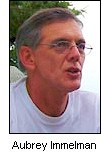 The purpose of the Unit for the Study of Personality in Politics Media Tipsheet is threefold. First, it offers political reporters looking for a fresh story angle a sometimes unique, often unconventional perspective on politics. Second, it serves as a repository for research-based political analysis. Analyses and predictions in the Tipsheet are, in effect, research hypotheses to be tested prospectively against actual event outcomes, which in turn serve to refine the guiding theory of personality and leadership that informed the analysis and prediction in the first place. Third, the Tipsheet aims to provide voters and reporters with politically unbiased, nonpartisan insights into aspects of candidates’ personal character likely to impinge on their public lives, campaign style, policy preferences, and leadership prospects.
The purpose of the Unit for the Study of Personality in Politics Media Tipsheet is threefold. First, it offers political reporters looking for a fresh story angle a sometimes unique, often unconventional perspective on politics. Second, it serves as a repository for research-based political analysis. Analyses and predictions in the Tipsheet are, in effect, research hypotheses to be tested prospectively against actual event outcomes, which in turn serve to refine the guiding theory of personality and leadership that informed the analysis and prediction in the first place. Third, the Tipsheet aims to provide voters and reporters with politically unbiased, nonpartisan insights into aspects of candidates’ personal character likely to impinge on their public lives, campaign style, policy preferences, and leadership prospects.
July 30, 2016
At the start of the general election campaign immediately following the Republican and Democratic national conventions, the “smart money” 100 days before the 2016 presidential election is on Hillary Clinton to win in a landslide.
As Rachel Maddow reported July 29 on MSNBC, the Rothenburg Political Report, the Cook Political Report, Sabato’s Crystal Ball, and the Princeton Election Consortium all projected more than 300 Electoral College votes for Clinton (270 needed to win).
Moreover, New York Times ‘Upshot,’ Nate Silver’s FiveThirtyEight, and PredictWise forecast, on average, a better than 60 percent chance of Clinton winning the election. [Aug. 3 update: The Upshot: 74%; FiveThirtyEight: 70%; PredictWise: 78%; Sam Wang: 80%]
Maddow’s discussion of the election-outcome predictions starts at 10:40 on the video segment below (“The Rachel Maddow Show,” July 29, 2016).
In contrast to the conventional wisdom, my own presidential election forecast model, the Personal Electability Index (PEI), projected as early as August 2015 that Donald Trump would defeat Hillary Clinton.
The PEI, developed at the Unit for the Study of Personality in Politics (USPP), has accurately predicted, before Super Tuesday, the outcome of every presidential election since 1996.
The PEI heuristic model employs candidate personality traits, as publicly perceived, to predict which contender will resonate most favorably with independent and unaffiliated voters who base their voting choice primarily on the candidate’s personal qualities as publicly displayed rather than on party-political affiliation or allegiance.
More information about the Presidential Electability Index
August 11, 2016 — Donald Trump’s Narcissism Is Not the Main Issue
On the psychology of politics, media attention has been focused on Donald Trump’s narcissism (see “Amateurs analyze Trump’s mind, but should the pros do it?” by Seth Borenstein, Associated Press, Aug. 11, 2016). However, in the context of the 2016 U.S. presidential campaign, Trump’s narcissism is not the main issue; Donald Trump and his Democratic opponent, Hillary Clinton, have identical Millon Inventory of Diagnostic Criteria scores on narcissism (MIDC scale 2: Ambitious = 24).
A narcissistic personality can be socially and politically adaptive (functional, nonpathological) if complemented and balanced by appropriately congruent personality patterns, as in the case of Hillary Clinton — at least insofar as erratic, undisciplined political behavior is concerned.
The critical difference between the Republican and Democratic nominees is their score on extraversion (MIDC scale 3: Outgoing; Trump = 24, Clinton = 0), which at higher elevations — as in the case of Trump — may be tantamount to a histrionic personality disorder.
Trump’s high score on the MIDC Outgoing scale accounts for his impulsiveness and lack of discipline and self-restraint (frequently referred to in media commentary as “no filter”).
Trump’s impulsive tendency is exacerbated by his remarkably low score on conscientiousness (MIDC scale 6: Conscientious = 0). Clinton, in contrast, is substantialy conscientious (MIDC scale 6: Conscientious = 15), which is associated with emotional restraint, self-discipline, and prudence.
Following personality theorist Theodore Millon, here’s a quick rundown of personality attributes associated with high elevations on the Outgoing pattern, which approaches histrionic levels in the case of Trump but fails to register on Clinton’s MIDC profile:
Expressive behavior: Dramatic/Impulsive — engaging, provocative, volatile; intolerant of inactivity, resulting in impulsive, highly emotional, and theatrical responsiveness.
Interpersonal conduct: Attention-seeking/Flamboyant — actively solicits attention and approval; vain and exhibitionistic, seeking to be the center of attention).
Cognitive style: Flighty/Scattered — avoids introspective thought, attentive to fleeting external events, and speaks in impressionistic generalities; integrates experiences poorly, resulting in scattered learning and thoughtless judgments.
Self-image: Gregarious/Charming — views self as sociable, stimulating, and charming; enjoys the image of attracting others by physical appearance and pursuing a busy and pleasure-oriented life.
Mood/temperament: Fickle/Impetuous — rapidly-shifting and shallow emotions; energetic, animated, hotheaded or impulsive, and exhibits a tendency to be easily enthused and as easily angered or bored.
Summary and formulation
To take the full measure of the man, political analysts must consider the interplay between Donald Trump’s ambitious (“narcissistic”) and outgoing (“histrionic”) tendencies, as described in the Millon Inventory of Diagnostic Criteria manual:
Persons who score high on both the Ambitious and Outgoing scales are clever and charming; they are skilled at attracting and seducing others. Though highly ambitious, Ambitious–Outgoing individuals also tend to be undisciplined, traveling an erratic course of successes, failures, and abandoned hopes. Needing excitement, stimulation, and challenge, they are easily bored by routine activities and they often act impulsively. They exhibit a restless, driven quality, which may be accompanied by a deficit in social dependability. Because agreements are often hastily assumed, they may have trouble honoring their promises or meeting their obligations. Ultimately, they are more attuned to their own needs than to those of others.
Though fundamentally self-oriented, these individuals are facile in the ways of social seduction, often feign an air of dignity and confidence, and are skilled in deceiving others with their clever glibness. They fabricate stories to enhance their worth and leave behind a trail of broken promises and outrageous acts. Fabrication serves both to nourish their inflated self-image and to seduce others into supporting their excesses; however, their disregard for the truth and talents for exploitation and deception are rarely hostile or malicious in intent. Typically, it is simply a product of their narcissistic attitude of omnipotence and their profound sense of entitlement; fundamentally, they are not malevolent. Criticism, confrontation, and punishment are unlikely to make them change their ways and, in fact, may prompt dismissive rage or anger.
For updates and additional information, please consult the Unit for the Study of Personality in Politics Media Tipsheet at http://personality-politics.org/http://personality-politics.org/media-tipsheet/
Related reports on this site
The Personality Profile of 2016 Republican Presidential Candidate Donald Trump (Aug. 9, 2015)
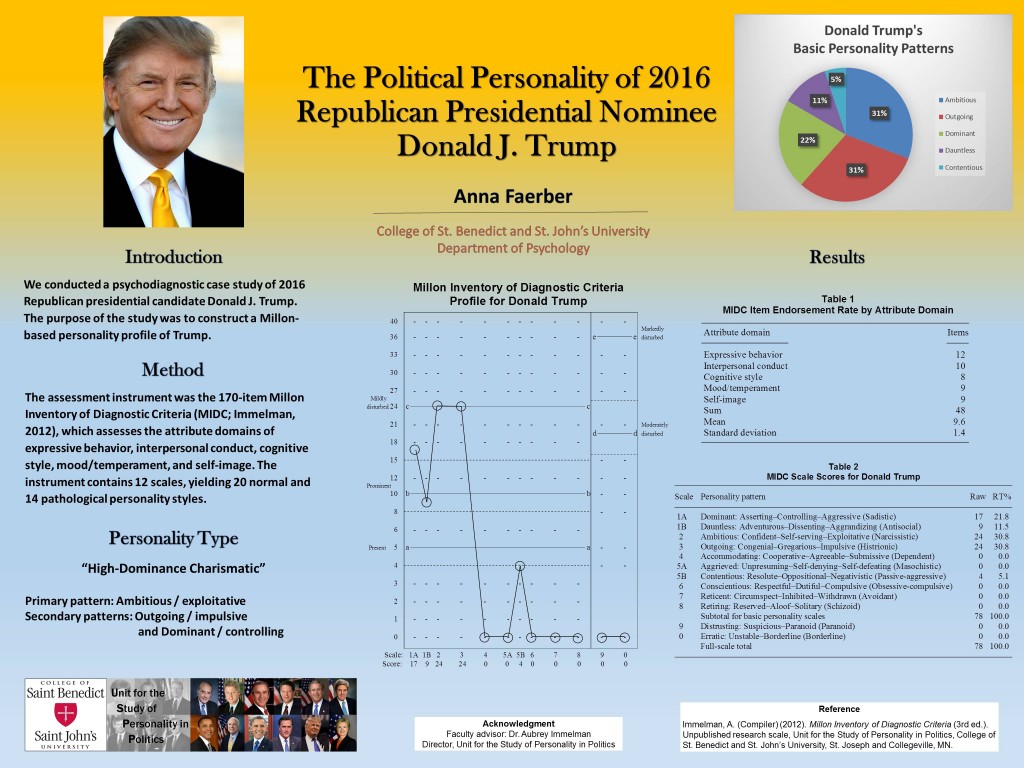
Click on image for larger view
The Personality Profile of 2016 Democratic Presidential Candidate Hillary Clinton (July 27, 2016)
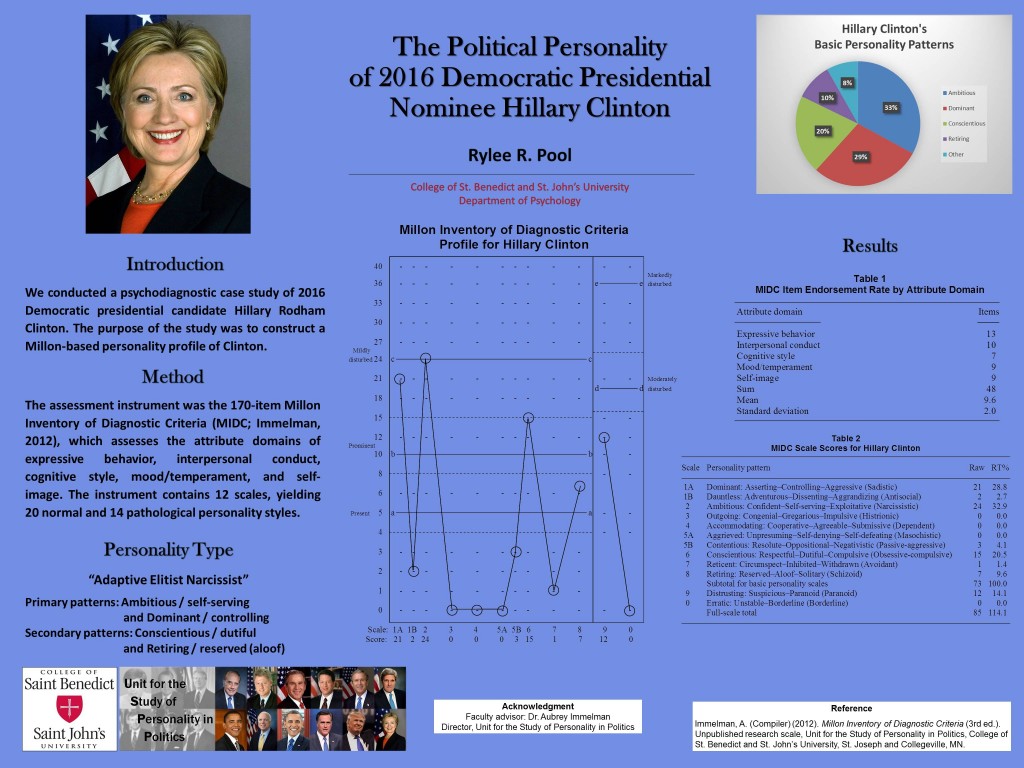
Click on image for larger view
Leave a Reply
You must be logged in to post a comment.

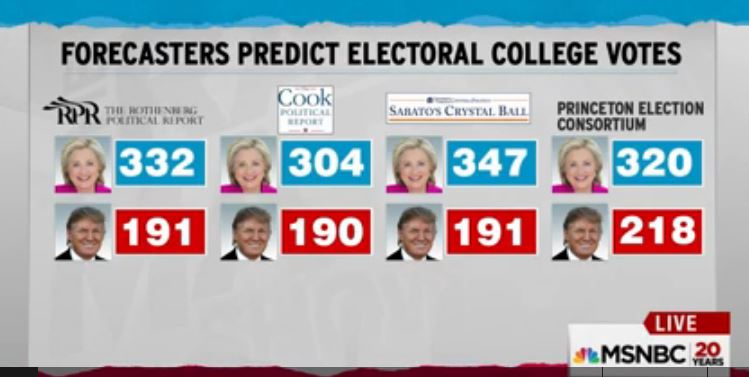
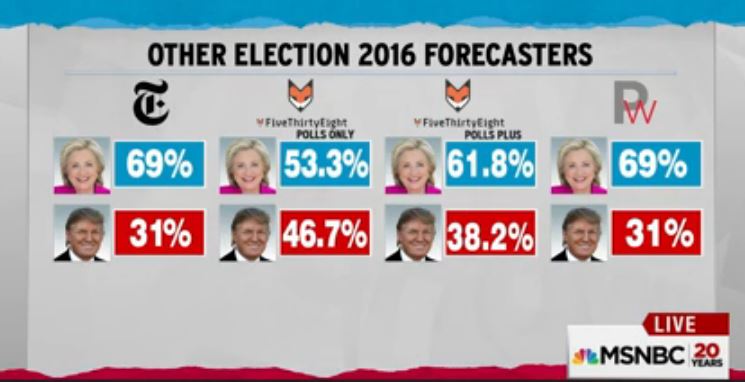

August 31st, 2016 at 8:41 am
Cross-posted from https://www.washingtonpost.com/politics/inside-debate-prep-clintons-careful-case-vs-trumps-wrestlemania/2016/08/27/ce05291c-6bbb-11e6-99bf-f0cf3a6449a6_story.html#comments
Aubrey Immelman
8/30/2016 7:16 PM CST
I happened upon yesterday’s NYT report [http://www.nytimes.com/2016/08/30/us/politics/hillary-clinton-donald-trump-debate.html] first on Hillary Clinton seeking advice from psychology experts on Donald Trump’s personality profile for purposes of debate prep and wrote a brief on how Clinton and Trump can each exploit the other’s personality weaknesses in the presidential debates » http://personality-politics.org/2016-election-media-tipsheet